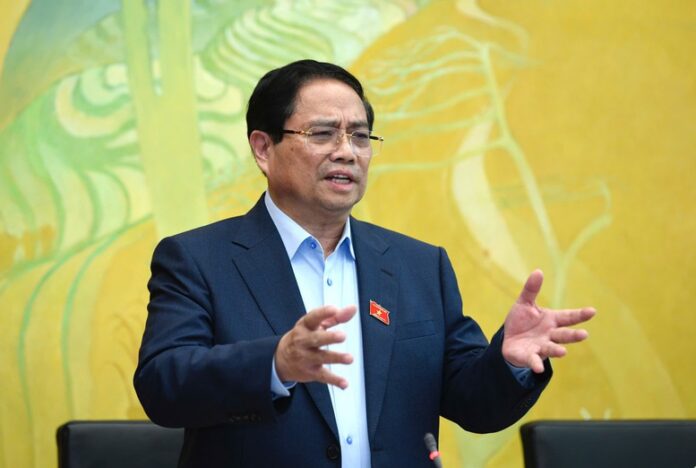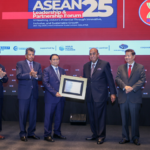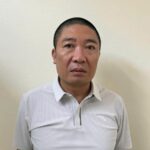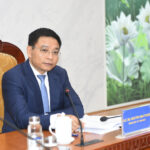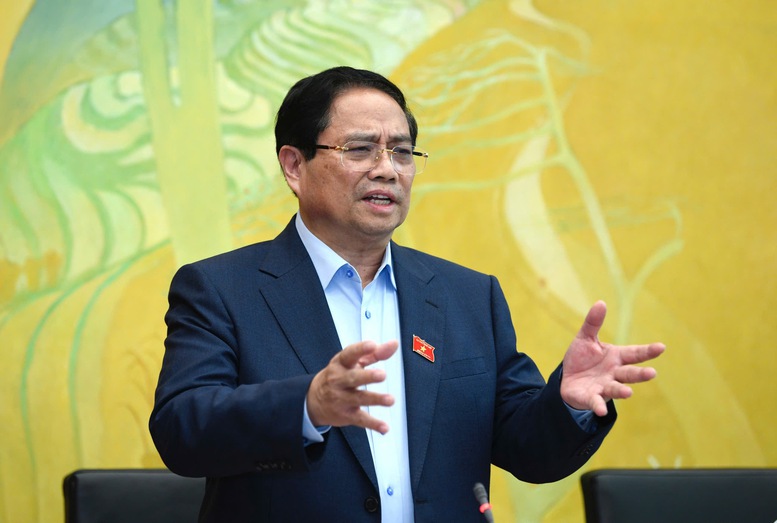
Prime Minister Pham Minh Chinh speaks during the National Assembly group discussion on May 23 morning – Photo: VGP/Nhat Bac
On May 23, the National Assembly discussed six contents: (1) supplementary evaluation of the implementation results of the socio-economic development plan and the state budget in 2024; the implementation situation of the socio-economic development plan and the state budget in the first months of 2025; (2) approval of the state budget settlement in 2023; (3) supplementing the regular budget (non-refundable foreign aid) in 2025; (4) the continuation of applying a number of mechanisms and policies after the rearrangement of the apparatus and the expansion of administrative boundaries according to the Party and State’s guidelines; (5) practicing thrift and anti-waste in 2024; (6) results of implementing the national target program on gender equality in 2024.
Speaking at the group discussion, Prime Minister Pham Minh Chinh, a National Assembly deputy from Can Tho, highly appreciated the quality of the deputies’ speeches, reflecting their grasp of the situation, fully reflecting the voters’ opinions and proposing solutions.
At the same time, the head of the Government shared and clarified some contents of the discussion according to the program and the deputies’ attention.
Solutions to achieve high growth
Regarding socio-economic issues, the Government has reported, and the Prime Minister emphasized some additional points.
Accordingly, in the very difficult context of the world, many countries and regions forecast lower economic growth than last year and the beginning of the year; but Vietnam sets a higher growth target than initially expected, striving to achieve 8% in 2025 and reaching double digits in the following years.
Thus, we are going against the world trend in terms of growth targets, so how can we be effective and successful? The Prime Minister raised the question and said that we are actively promoting three strategic breakthroughs in institutions, infrastructure and human resources.
In particular, institutions are the bottleneck of bottlenecks, the breakthrough of breakthroughs, the driving force, and the resource for development. We are determined that in 2025, we will basically remove institutional bottlenecks and thereby turn institutions into a competitive advantage. The Prime Minister suggested that the National Assembly strongly support this.
Second, promote the strategic breakthrough in infrastructure, which is also a bottleneck because logistics costs account for 17-18% of GDP, compared to about 10-11% in the world, reducing the competitiveness of Vietnamese goods.
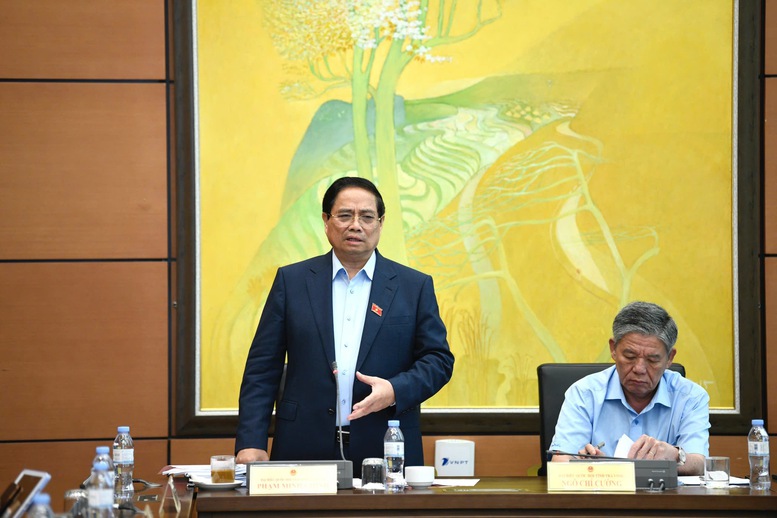
Prime Minister emphasizes solutions to achieve high growth – Photo: VGP/Nhat Bac
The Prime Minister said that he is focusing on developing strategic infrastructure, especially all five modes of transportation.
In terms of roads, it is necessary to complete at least 3,000 km of expressways and 1,000 km of coastal roads this year. Regarding railways, deploy the North-South high-speed railway project, the lines connecting with China, thereby opening up international connections with Central Asia and Europe, urban railways, and upgrade existing railways.
In inland waterways, focus on development in the Mekong Delta, which has advantages in this field. In aviation, build, expand and upgrade strategic airports that can accommodate the largest aircraft, develop the fleet, and develop multiple airlines to create competition for the benefit of the people. In terms of maritime transport, build large ports such as Lach Huyen, Cai Mep-Thi Vai, Can Gio, and Hon Khoai that can receive large ships.
At the same time, synchronously develop health, education, culture, sports and social infrastructure…, infrastructure for digital transformation, infrastructure for science and technology, infrastructure for climate change response…
Third, in the human resources breakthrough, the Prime Minister said that it is necessary to shift from mainly training knowledge to comprehensively training skills, training international-standard human resources, meeting the requirements of integration, thereby increasing labor productivity.
Along with the three strategic breakthroughs, we are resolutely implementing the four pillars according to the Resolutions of the Politburo: (1) Resolution 57-NQ/TW on breakthrough development of science and technology, innovation and digital transformation; (2) Resolution 59-NQ/TW on international integration in the new situation; (3) Resolution 66-NQ/TW on innovation in law building and law enforcement; (4) Resolution 68-NQ/TW on developing the private economy.
Recently, we have been very active in these pillars, and in just a few months, we have completed the construction and submission of Resolutions of the Politburo, National Assembly and Government for implementation, contributing to promoting rapid and sustainable growth.
The Prime Minister also said that we are resolutely renewing traditional growth drivers, including investment, export, consumption, fiscal and monetary policies. In terms of fiscal policy, it is necessary to reduce taxes, fees and charges for businesses and people, while collecting correctly, fully and promptly, strengthening the saving of regular expenditures to increase investment expenditures for development; In terms of monetary policy, efforts should be made to reduce interest rates, increase access to capital, debt rescheduling, and debt relief…
Promote production and business, diversify markets, products and supply chains, reduce input costs, compliance costs, and cut administrative procedures to the maximum extent for people and businesses. Vietnam is also ready to listen and dialogue to resolve concerns of partners in the spirit of mutual benefit, harmonious interests, and risk sharing, including continuing negotiations with the US on tariffs and trade.
Along with that, promote new growth drivers such as science and technology, innovation, digital transformation, digital economy, green economy, circular economy, sharing economy… These drivers are motivated and inspired by the resolutions of the Party, National Assembly, Government, ministries, branches and localities must actively and proactively implement.
“In difficult conditions, countries all reduce growth, but we dare to go against the trend. In special conditions, there must be special solutions, the sectors and levels must unite and be unanimous in doing so, determination must be high, efforts must be great, and actions must be strong and effective, focusing on key points, doing one thing at a time, thinking broadly and doing big things, dividing work clearly “clear person, clear job, clear time, clear responsibility, clear product, clear authority”. Only by doing so can we achieve the set goals for growth and the two 100-year goals,” emphasized the Prime Minister.
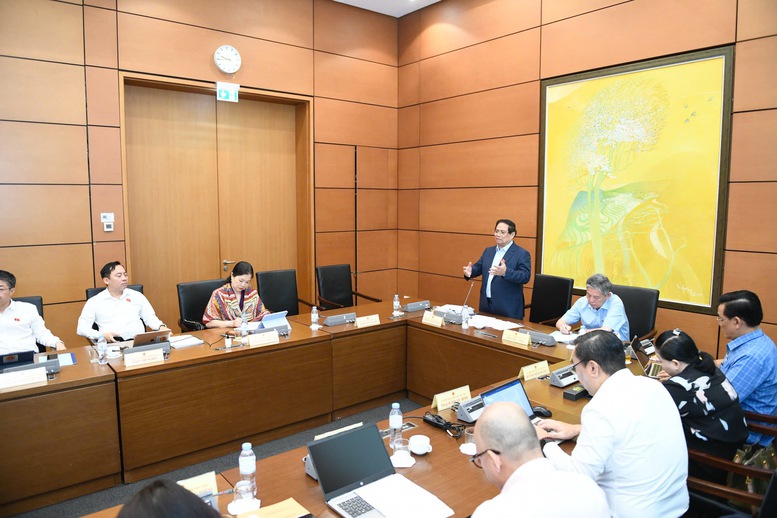
Prime Minister Pham Minh Chinh, a National Assembly deputy from Can Tho, highly appreciated the quality of the deputies’ speeches, reflecting their grasp of the situation – Photo: VGP/Nhat Bac
Build planning, standards, people, and businesses will do so
Regarding streamlining the apparatus, rearranging administrative boundaries of levels and local government, the Prime Minister said that this will help reduce intermediate steps, reduce administrative procedures, and facilitate spatial connection.
However, the Prime Minister emphasized the most important point, which is to shift the state apparatus from passively receiving and handling the requirements of the people and businesses to actively and proactively serving the people and businesses. To do this, the Party committees, authorities, the entire political system and the people must actively participate.
The Prime Minister said that in recent years, the Government and agencies have actively built planning; in the past time, administrative procedures have been cut, towards building standards, norms, and other necessary conditions, and then publicly announcing them, so that the people and businesses will follow the planning, norms and standards, and do what the law does not prohibit; Meanwhile, instead of pre-checking and licensing, the authorities will strengthen post-checks, inspections and supervision.
The Prime Minister also said that it is necessary to build databases in the fields of land, population, marriage and family, housing, students, patients… to speed up procedures, meeting the requirements of administrative reform.
“Waiting for a forest of procedures, the opportunity will be gone”
Another extremely important issue mentioned by the Prime Minister is to promote decentralization and empowerment, along with resource allocation, strengthening implementation capacity and strengthening inspection and supervision.
The Prime Minister raised the issue: “If decentralization and empowerment are not accompanied by resource allocation, everything has to be asked, it will not be possible to do it, and it will create many administrative procedures.” Especially for things that are naturally necessary, they are put forward and no one opposes them, but procedures must still be followed.
From there, the Prime Minister pointed out an issue that has not been fully assessed at present, which is the waste of opportunities and time. According to the Prime Minister, opportunities come and go very quickly, but if we “wait for a forest of procedures, the opportunity will be gone”.
Therefore, decentralization and empowerment must be in the spirit of proactively serving the people and businesses; for unexpected and sudden matters that bring opportunities, they need to be resolved quickly, not waiting for administrative procedures. The Prime Minister suggested that the National Assembly decentralize and empower the Government, and the Government will decentralize and empower ministries, branches and localities.
Along with decentralization and empowerment to localities, the central ministries and agencies play a creative role, not doing specific jobs but focusing on implementing six groups of state management tasks: (1) building strategies, planning and plans; (2) building institutions and laws to manage and create development; (3) building mechanisms and policies to mobilize resources for the rapid and sustainable development of industries and fields; (4) designing tools to inspect, supervise and control power; (5) evaluating, summarizing reality, drawing experiences, building theories, replicating good models and good ways of doing things, and removing difficulties and obstacles; (6) implementing emulation and reward work, handling discipline in a timely, accurate, fair, reasonable and effective manner.
Transforming the state of service of the people in health and education
The Prime Minister also spent a lot of time referring to the fields of education and health in the implementation of the two-level local government.
Emphasizing that people are the center and subject, the Prime Minister said that according to the direction of General Secretary To Lam, the Government is currently building two draft Resolutions to submit to the Politburo on modernizing, breaking through the development of education and training, and on breaking through in taking care of people’s health, meeting the requirements of national development in the new era.
In the field of health, the Prime Minister said that the transformation of the state is very important, from passively receiving and serving the people in examination and treatment to actively serving, taking care of and protecting the people’s lives and health, including examination and treatment. From this goal, it is possible to calculate tasks and solutions, from tasks and solutions to calculate organizations, and from organizations to calculate people, ensuring rationality and efficiency. In which, it is necessary to develop health facilities, especially to consolidate preventive medicine and grassroots health facilities – the places closest to the people.
Similarly, it is necessary to transform the state in the field of education, from mainly transmitting knowledge to training both skills and comprehensively developing people.
The Prime Minister said that education must focus on improving the quality of teaching and learning, including learning materials, infrastructure, and teaching methods. Along with that, there must be mechanisms and policies to encourage socialization, especially at the university level, while taking care of general education, exempting tuition fees for students at public schools and supporting tuition fees for students at private schools.
Especially, it is necessary to ensure equal access to education for remote, border and island areas and disadvantaged subjects; to do so, there must be schools and classes, especially focusing on building boarding and semi-boarding schools. “If not, if the school is far from home, the children will find it difficult to go to school, and if there is no lunch, how can the children stand it,” said the Prime Minister.
Along with that, it is necessary to deploy two sessions a day without collecting fees, the second session focusing on training life skills, culture, sports and arts… “There must be a holistic approach to solve the problems related to people,” the Prime Minister said.
Regarding microfinance, the Prime Minister said that he had assigned the Governor of the State Bank to concurrently hold the position of Chairman of the Social Policy Bank, so as to ensure equal access, handle well when implementing the two-level local government. The spirit is to implement the two-level local government but not to interrupt the tasks, especially the key tasks of serving the people, serving production and business, and serving growth.
Accept “pain” to resolve stagnant projects
Regarding thrift practice and anti-waste, the Prime Minister said that we have “caught the right disease”, the General Secretary has had an important article, and the agencies are continuing to build and perfect the institutions for organization and implementation.
The Government has reported to the National Assembly about the waste situation related to stagnant projects, prolonged for many years and terms, as well as waste related to inappropriate policies in the field of wind and solar power.
The Prime Minister said that according to statistics from localities, there are about 2,200 stagnant projects across the country. If these projects are unblocked, it is possible to release about 230 billion USD, equivalent to about 50% of the country’s GDP. To be able to release resources in stagnant projects, the Government is continuing to build mechanisms and policies to submit to competent levels for handling.
Regarding wind and solar power, recently, a series of projects have been handled through Resolution 133. The reason is that the policy is not good, leading to negativity, rushing to build projects that are not in accordance with planning and procedures…
The head of the Government affirmed the view that it is not to legalize violations but to find solutions to handle them. Like handling in terms of organization and personnel, handling in terms of institutions, removing legal obstacles, and removing ways of implementation. “The situation has changed, so the task must change, and the mechanisms and policies must change,” said the Prime Minister.
Notably, the Prime Minister said that it is necessary to accept this as a “disease”, and if it is a disease, it must be cured, but the cure must be correct. “Curing the disease, one is to have surgery, which must be painful and lose blood, and the other is to treat it clinically, which still takes money. In short, if we want to overcome the consequences, we cannot expect to recover 100%, we must accept losses, accept pain, and accept what must be cut off,” said the Prime Minister. What’s important is that when we cut out these pains, they will give us new lessons and new experiences to avoid repeating them in the future.
“Resolving stagnant projects thoroughly is something that must be done. We must accept some loss, consider it a tuition fee. From there, we need to come up with mechanisms and policies, be determined to resolve and resolve thoroughly,” said Prime Minister Pham Minh Chinh.
At the same time, the Prime Minister said that the land of forestry and agricultural farms is also a pressing issue. In the past, the management, establishment of forestry and agricultural farms was very necessary in the process of development, but when implementing, we loosened management, did not have timely, flexible and effective policies and laws.
Therefore, now we have to go to solve the consequences in both legal and practical terms, so as to overcome them in the most optimal way, if we do not accept pain and loss, we cannot solve them thoroughly.
Regarding the handling of headquarters after streamlining the apparatus and rearranging administrative boundaries, the Prime Minister said that he had assigned the Ministry of Finance to guide, but the
“Premier Pham Minh Chinh Named Outstanding ASEAN Leader 2025”
On May 25, in Kuala Lumpur, as part of his official visit to Malaysia and attendance at the 46th ASEAN Summit, Prime Minister Pham Minh Chinh participated in the ASEAN Leadership and Partnership Forum. At this event, the Asia-Pacific Strategic Research Institute (KSI) honored him as the Outstanding ASEAN Leader of the Year 2025 – a recognition of Vietnam’s significant contributions to the region’s development process.
Indictment and Arrest of Deputy Director Ngo Vinh Hai
The Nam Dinh Provincial Police have announced that they have recently initiated criminal proceedings and charged four individuals with the offense of “Forgery of Documents of Agencies and Organizations” in relation to illegal sand mining activities.
Samsung Reiterates Tax Refund Proposal to the Ministry of Finance for Samsung HCMC CE Complex in Ho Chi Minh City
Samsung Group is the largest foreign investor in Vietnam, employing approximately 100,000 Vietnamese citizens. The company’s significant presence in the country has had a profound impact on the local economy, creating a ripple effect of opportunities and contributing to the nation’s thriving business landscape. With its cutting-edge technology and innovative spirit, Samsung has not only boosted Vietnam’s economic growth but also played a pivotal role in elevating the country’s reputation as a desirable investment destination.
The Art of Cosmetic Crafting: A Woman’s Journey to Success in Thanh Hoa
To rival renowned cosmetic brands, Nguyen Thi Dung ordered creams, mixers, and coloring agents to produce her own makeup products at home and sell them to consumers.

